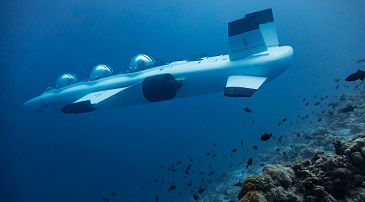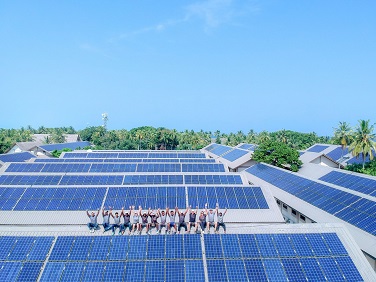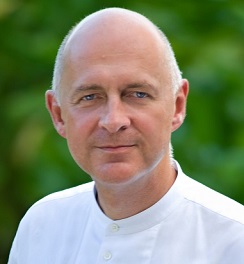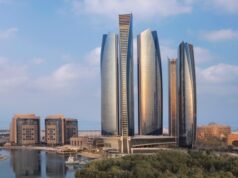 MALDIVES—It doesn’t get much more rarefied than the Four Seasons Resorts Maldives, a pair of luxury oases on the isolated island country in the Indian Ocean—a seeming refuge from many of the world’s problems. The brand has two locations in the islands—Four Seasons Resort at Kuda Huraa; and Four Seasons Resort at Landaa Giraavaru.
MALDIVES—It doesn’t get much more rarefied than the Four Seasons Resorts Maldives, a pair of luxury oases on the isolated island country in the Indian Ocean—a seeming refuge from many of the world’s problems. The brand has two locations in the islands—Four Seasons Resort at Kuda Huraa; and Four Seasons Resort at Landaa Giraavaru.
Despite the properties’ exclusivity, Armando Kraenzlin, Regional Vice President and General Manager, has made conservation central to the very operation of the properties. He has focused on three major initiatives; rebuilding coral reefs, rehabilitating injured sea turtles, and protecting manta rays in the more than two decades since he came to the property in 1998.
Kraenzlin arrived in 1998 just as the El Niño bleached 90 percent of the coral reefs in the Maldives. His initial plan to help rebuild a coral reef evolved to a mindset that stewardship of the ocean was his real job.
With the backing of ownership and resort management, the resorts created MarineSavers, which they call the first resort-based marine conservation and research team of marine biologists. The Marinesavers.com website provides information on all the conservation efforts being undertaken by the resort.
Here are Some of Those Initiatives:
- Founded the Maldives’ first coral regeneration project in 2002, one of the most successful of its kind in the world. More than 7,000 coral frames featuring 40 species of coral have been deployed.
- Established the Maldivian Manta Ray Project in 2005. This became the founding project of the Manta Trust, the world’s leading manta ray charity, and contributed to the full protection of manta rays in the Maldives in 2014.
- Inaugurated the Maldives’ first Turtle Rehabilitation Center in 2011. More than 340 injured sea turtles have been rehabilitated; six non-releasable turtles have been rehomed.
- Successfully bred Nemo, the Maldivian clownfish made famous by the Pixar film “Finding Nemo” to help curb harvesting of sea creatures from the wild.
- Introduced the first sustainable and environmentally responsible mosquito control initiative into the UNESCO Biosphere Reserve in 2015, working with Mosquito Lady Consulting.
A New Way of Being for Travel
“There’s a chance for the travel industry to establish a new way of being where sustainability actions are the norm, not simply the ideal,” said Kraenzlin when the resort joined the NOW Force for Good Alliance, a global community committed to raising the bar on how the hospitality industry and the traveler impact the environment.
 His resorts, said Kraenzlin, began experimenting with reef rejuvenation in 2001 and over the next few years developed a technology that positions rebar (steel-reinforced concrete) with coral fragments. There was quick success and in the last 20 years over 7,000 of these structures were deployed in the two resorts. The resorts work with an organization called Reefsavers.com on those efforts.
His resorts, said Kraenzlin, began experimenting with reef rejuvenation in 2001 and over the next few years developed a technology that positions rebar (steel-reinforced concrete) with coral fragments. There was quick success and in the last 20 years over 7,000 of these structures were deployed in the two resorts. The resorts work with an organization called Reefsavers.com on those efforts.
Sadly, another El Niño in 2016 bleached the reefs once again. Kraenzlin’s response? “We started again. We can’t give up.” He said he is optimistic by nature and that there were almost 20 good years between the two El Niño’s with the reef recovering nicely after 10 years. If the next El Niño is in 20 years from now, said Kraenzlin, there is time for recovery.
When reefs are under pressure, said Kraenzlin, there are other affects, like erosion. When he first came to the Maldives, it was not necessary to manage beaches. Now every resort must pump water out every year and some have put up walls because of climate change. Within 20 minutes of his property, said Kraenzlin, beaches have gone from 100 percent of their original size to 30 percent and, he said, “we need to learn what causes these impacts.”

A Need to Do Something
When Kraenzlin came to the Maldives after working at luxury hotels in Asia for many years—a formative experience for him—he quickly gained a feeling that he needed to do something, partly out of curiosity and also as a way to engage with customers. In fact, customers are engaged actively with the resort’s initiatives. And, he said, “this starts to affect business in a positive way.” For example, said Kraenzlin, families are drawn to the property because of the scientists at the Marine Discovery Center.
Guests can participate in:
- Coral reef building—involves attaching coral fragments onto a coral frame.
- Baby turtle feedings: including feeding, cleaning, weighing, measuring, and monitoring turtles.
- Accompany manta ray teams on a research vessel.
Asked what other hoteliers might learn from the Four Seasons’ efforts, Kraenzlin said it is not in the company’s culture to “lecture” other operators. However, he did say that he encouraged others to undertake initiatives like an apprenticeship program where 650 students between the ages of 17 and 20 from the Maldives over the last 20 years have lived, studied and worked onsite, gaining hands-on experience in many disciplines.
Since the very beginning, said Kraenzlin, “we have taken every step to ensure our presence in the Maldives is positive, from training and developing local talent to protecting and preserving the beautiful natural environment,” The apprenticeship program, he said, “is testament to our commitment to the island communities of the Maldives, providing the skills, certification and platform for aspiring hoteliers to secure their futures.”







